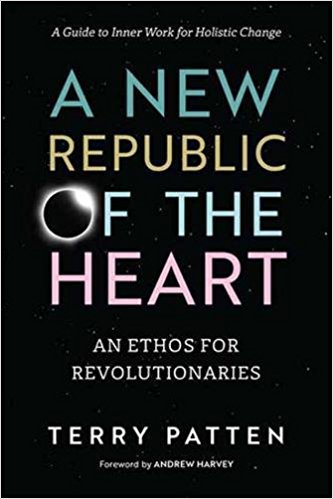Boom or Doom?
April 22, 2018
Excerpted from A New Republic of the Heart
 Two compelling and mutually conflicting metanarratives, each with conflicting views of our predicament, are in competition among intelligent observers. The first is optimistic. It is a narrative of continual survival, adaptation, transcendence, and progression. In this view, our technological and cultural advances are entering a period of game-changing exponential acceleration. Our increasing collisions with planetary limits, and the unfolding catastrophic consequences of our unsustainable behaviors, though very real, will finally sober us and force us to change our collective habits, and we will have new means to ease the transition. Circumstances will teach us wisdom and set us firmly back on a positive evolutionary path into a marvelous unchartable future.
Two compelling and mutually conflicting metanarratives, each with conflicting views of our predicament, are in competition among intelligent observers. The first is optimistic. It is a narrative of continual survival, adaptation, transcendence, and progression. In this view, our technological and cultural advances are entering a period of game-changing exponential acceleration. Our increasing collisions with planetary limits, and the unfolding catastrophic consequences of our unsustainable behaviors, though very real, will finally sober us and force us to change our collective habits, and we will have new means to ease the transition. Circumstances will teach us wisdom and set us firmly back on a positive evolutionary path into a marvelous unchartable future.An evolutionary version of this narrative sees our precarious global predicament as an important transition but a temporary bottleneck in our upward evolutionary trajectory. It sees a powerful creative drive, native to every morsel of reality, driving our evolution. is dominant creative factor will be key to ensuring our continued survival and progress in ecology, science, culture, ethics, technology, politics, economics, and consciousness.
In the version of this narrative that inspires me, humankind will eventually establish a metacommunity, or metasangha, of “communities of practice,” expressing our highest ethics and values. And this future civilization will eventually manifest a new stage in the evolution of the human race—a new adulthood for the species—perhaps even a unified and transcendent super-organism that some see as the next Buddha, or as the true meaning of the second coming of Christ.
The second, equally influential metanarrative is pessimistic and socio- ecological. It sees a more primitive and instinctual power as the dominant force driving both our development and our degeneration, and ultimately determining our fate. This darker side of that raw evolutionary energy or Eros manifests as an unquenchable and compulsive drive for survival, dominance, adventure, acquisition, conquest, consumption, and control. We have long been in the grip of this power-Eros, and look at what has happened. We’ve nea
 rly exhausted Earth’s resources, enormously overshot its carrying capacity, and are now on the verge of an age of contraction, scarcity, environmental degradation, social upheaval, and economic collapse—and these dangers appear more likely with every passing year.
rly exhausted Earth’s resources, enormously overshot its carrying capacity, and are now on the verge of an age of contraction, scarcity, environmental degradation, social upheaval, and economic collapse—and these dangers appear more likely with every passing year.In this narrative, humankind’s unbridled drives will inexorably lead to the collapse of civilization and the planetary biosphere, resulting in mass species extinctions—and, in time, scenarios that may well lead to a dystopian, nearly uninhabitable planet and perhaps the end of the human race. Many deep ecologists say we have already entered the early stages of the collapse of human civilization.
My life and work have been fueled and inspired by the optimistic evolutionary metanarrative. But I’ve been shaken, sobered, and educated by my intensive study of the science and journalism supporting the pessimistic metanarrative, which more realistically accounts for the latest current data. The history and evolution of humankind, and even of each individual life, reveals a struggle between the forces and effects of the evolutionary-creative Eros and the instinctual-power Eros. And while we may place our hopes in the first narrative, we cannot dismiss the mounting evidence that supports the second. No one can know for sure which of these metanarratives will shape our future. We are suspended between two antithetical possibilities, as well as a spectrum of possibilities between the two extremes. I believe that even though certainty is beyond our grasp, we are the prime actors in the drama. And even without any certainty, we can greatly influence the outcomes.
I take this to heart, and I suggest we all do, because we’re each partially in charge. The locus of control of human civilization—this vast and hypercomplex system—is distributed, nonlinear, and unpredictable. It is no more conscious, no more able to choose its direction, anywhere else than it is right here, right now. That implicates me, and you, at least in some small but potentially significant way. If humanity is to wake up to its predicament and choose a sustainable future, millions of people will necessarily participate. And where might that awakening and participation begin? When? I can’t expect it to be the exclusive responsibility of someone else—of some political or spiritual leader or expert or philanthropist or celebrity. It must also depend on me, if I am aware enough to sense and feel that I can make some small difference—and the same goes for you.


